Managing in Global Business Environment: Telstra's Challenges
VerifiedAdded on 2023/06/10
|8
|2667
|164
Report
AI Summary
This report provides an in-depth analysis of the challenges Telstra faces in the global business environment. It addresses the increasing competition within the telecommunications industry, the rapid advancements in technology, and the ethical considerations that arise. The report highlights Telstra's need to adapt to changing market demands, manage customer retention, and navigate the complexities of global human resource management. It explores the importance of strategic planning, including investment in emerging technologies like IoT and the expansion into markets like Asia. Furthermore, the report examines ethical issues such as data management, security, and privacy, emphasizing the need for robust policies. The report also discusses challenges related to organizational culture, decision-making, and the sustainable use of resources. Overall, the report emphasizes the need for Telstra to develop comprehensive strategies to overcome these challenges and capitalize on global opportunities for continued success.
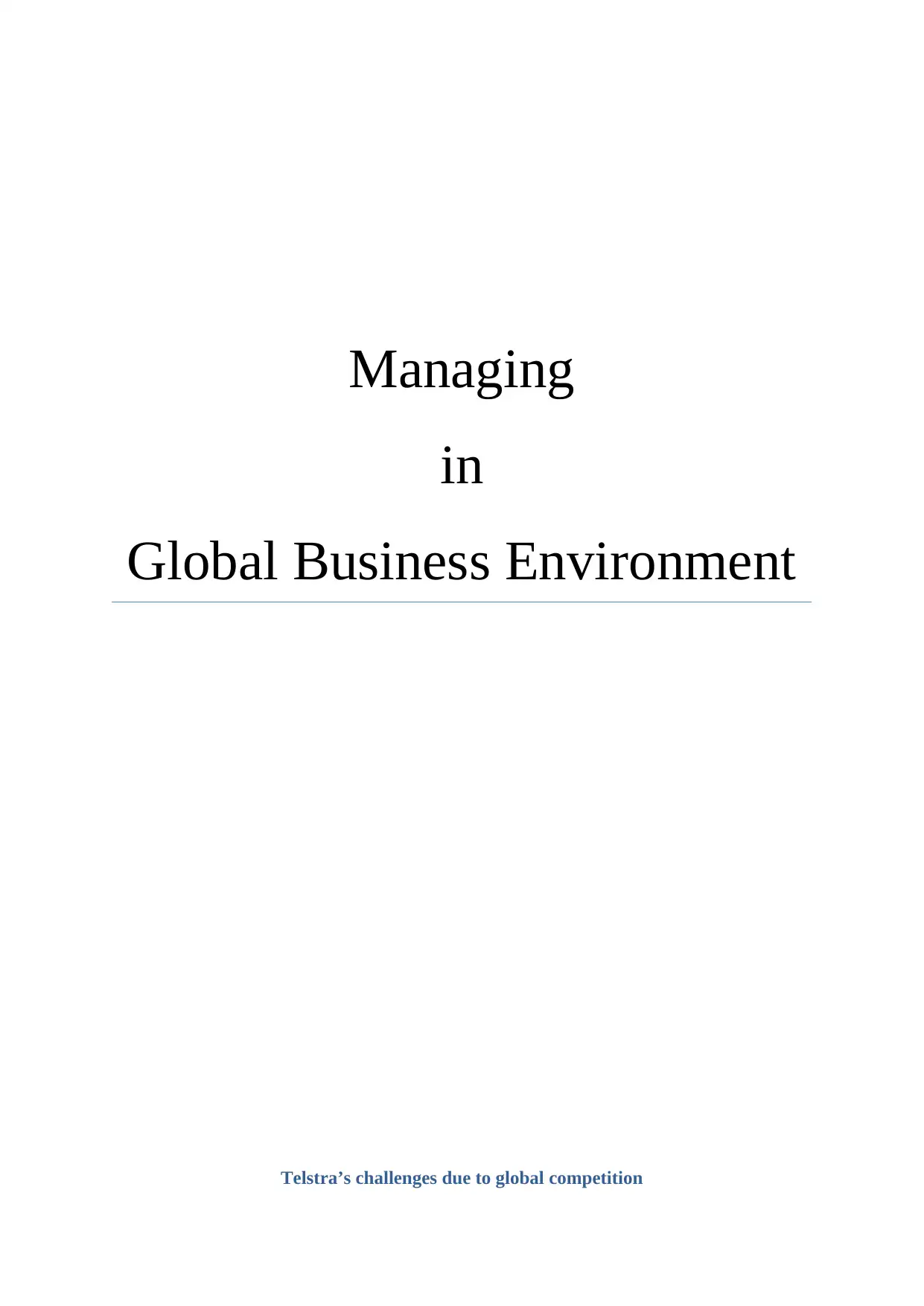
Managing
in
Global Business Environment
Telstra’s challenges due to global competition
in
Global Business Environment
Telstra’s challenges due to global competition
Paraphrase This Document
Need a fresh take? Get an instant paraphrase of this document with our AI Paraphraser
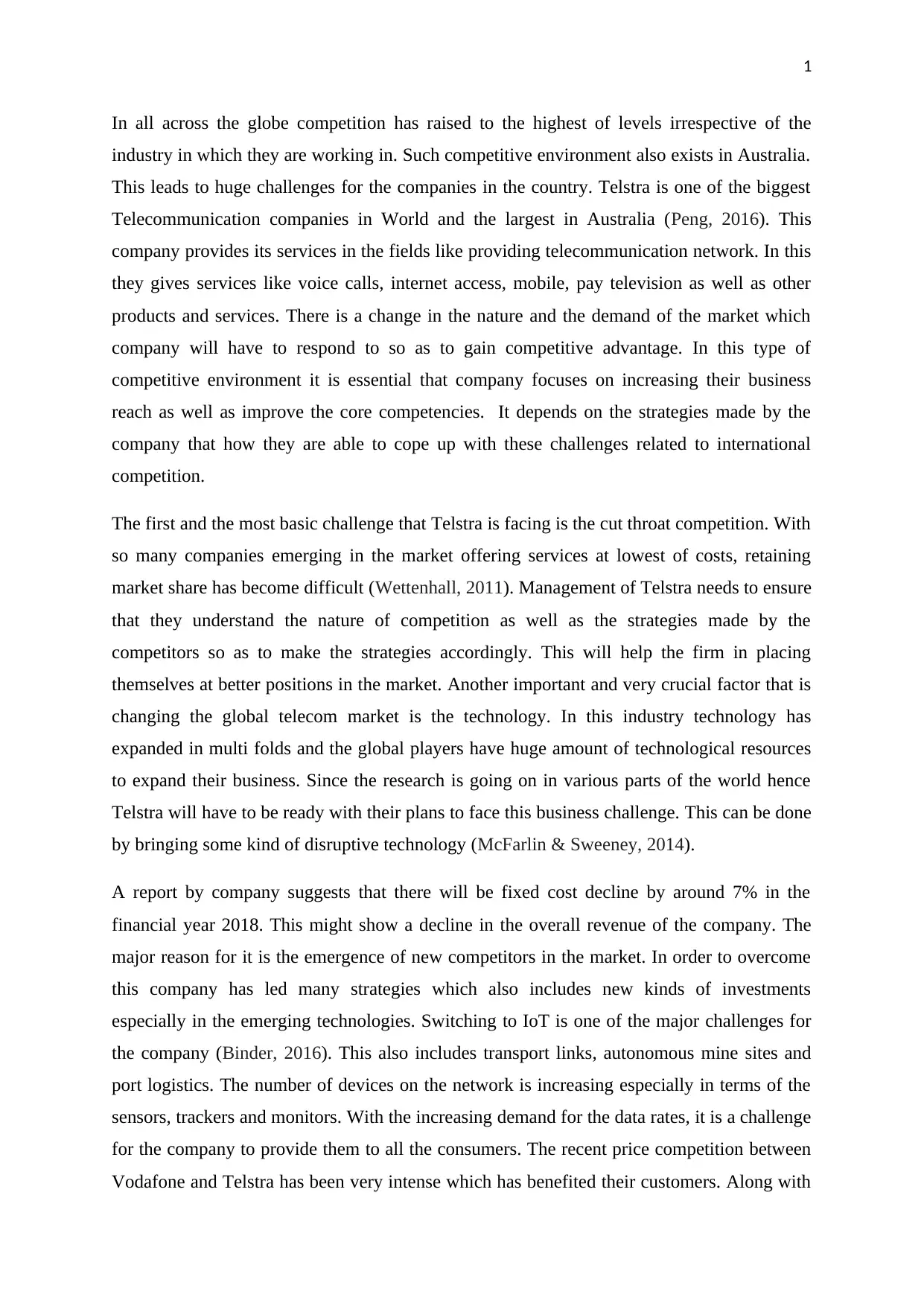
1
In all across the globe competition has raised to the highest of levels irrespective of the
industry in which they are working in. Such competitive environment also exists in Australia.
This leads to huge challenges for the companies in the country. Telstra is one of the biggest
Telecommunication companies in World and the largest in Australia (Peng, 2016). This
company provides its services in the fields like providing telecommunication network. In this
they gives services like voice calls, internet access, mobile, pay television as well as other
products and services. There is a change in the nature and the demand of the market which
company will have to respond to so as to gain competitive advantage. In this type of
competitive environment it is essential that company focuses on increasing their business
reach as well as improve the core competencies. It depends on the strategies made by the
company that how they are able to cope up with these challenges related to international
competition.
The first and the most basic challenge that Telstra is facing is the cut throat competition. With
so many companies emerging in the market offering services at lowest of costs, retaining
market share has become difficult (Wettenhall, 2011). Management of Telstra needs to ensure
that they understand the nature of competition as well as the strategies made by the
competitors so as to make the strategies accordingly. This will help the firm in placing
themselves at better positions in the market. Another important and very crucial factor that is
changing the global telecom market is the technology. In this industry technology has
expanded in multi folds and the global players have huge amount of technological resources
to expand their business. Since the research is going on in various parts of the world hence
Telstra will have to be ready with their plans to face this business challenge. This can be done
by bringing some kind of disruptive technology (McFarlin & Sweeney, 2014).
A report by company suggests that there will be fixed cost decline by around 7% in the
financial year 2018. This might show a decline in the overall revenue of the company. The
major reason for it is the emergence of new competitors in the market. In order to overcome
this company has led many strategies which also includes new kinds of investments
especially in the emerging technologies. Switching to IoT is one of the major challenges for
the company (Binder, 2016). This also includes transport links, autonomous mine sites and
port logistics. The number of devices on the network is increasing especially in terms of the
sensors, trackers and monitors. With the increasing demand for the data rates, it is a challenge
for the company to provide them to all the consumers. The recent price competition between
Vodafone and Telstra has been very intense which has benefited their customers. Along with
In all across the globe competition has raised to the highest of levels irrespective of the
industry in which they are working in. Such competitive environment also exists in Australia.
This leads to huge challenges for the companies in the country. Telstra is one of the biggest
Telecommunication companies in World and the largest in Australia (Peng, 2016). This
company provides its services in the fields like providing telecommunication network. In this
they gives services like voice calls, internet access, mobile, pay television as well as other
products and services. There is a change in the nature and the demand of the market which
company will have to respond to so as to gain competitive advantage. In this type of
competitive environment it is essential that company focuses on increasing their business
reach as well as improve the core competencies. It depends on the strategies made by the
company that how they are able to cope up with these challenges related to international
competition.
The first and the most basic challenge that Telstra is facing is the cut throat competition. With
so many companies emerging in the market offering services at lowest of costs, retaining
market share has become difficult (Wettenhall, 2011). Management of Telstra needs to ensure
that they understand the nature of competition as well as the strategies made by the
competitors so as to make the strategies accordingly. This will help the firm in placing
themselves at better positions in the market. Another important and very crucial factor that is
changing the global telecom market is the technology. In this industry technology has
expanded in multi folds and the global players have huge amount of technological resources
to expand their business. Since the research is going on in various parts of the world hence
Telstra will have to be ready with their plans to face this business challenge. This can be done
by bringing some kind of disruptive technology (McFarlin & Sweeney, 2014).
A report by company suggests that there will be fixed cost decline by around 7% in the
financial year 2018. This might show a decline in the overall revenue of the company. The
major reason for it is the emergence of new competitors in the market. In order to overcome
this company has led many strategies which also includes new kinds of investments
especially in the emerging technologies. Switching to IoT is one of the major challenges for
the company (Binder, 2016). This also includes transport links, autonomous mine sites and
port logistics. The number of devices on the network is increasing especially in terms of the
sensors, trackers and monitors. With the increasing demand for the data rates, it is a challenge
for the company to provide them to all the consumers. The recent price competition between
Vodafone and Telstra has been very intense which has benefited their customers. Along with
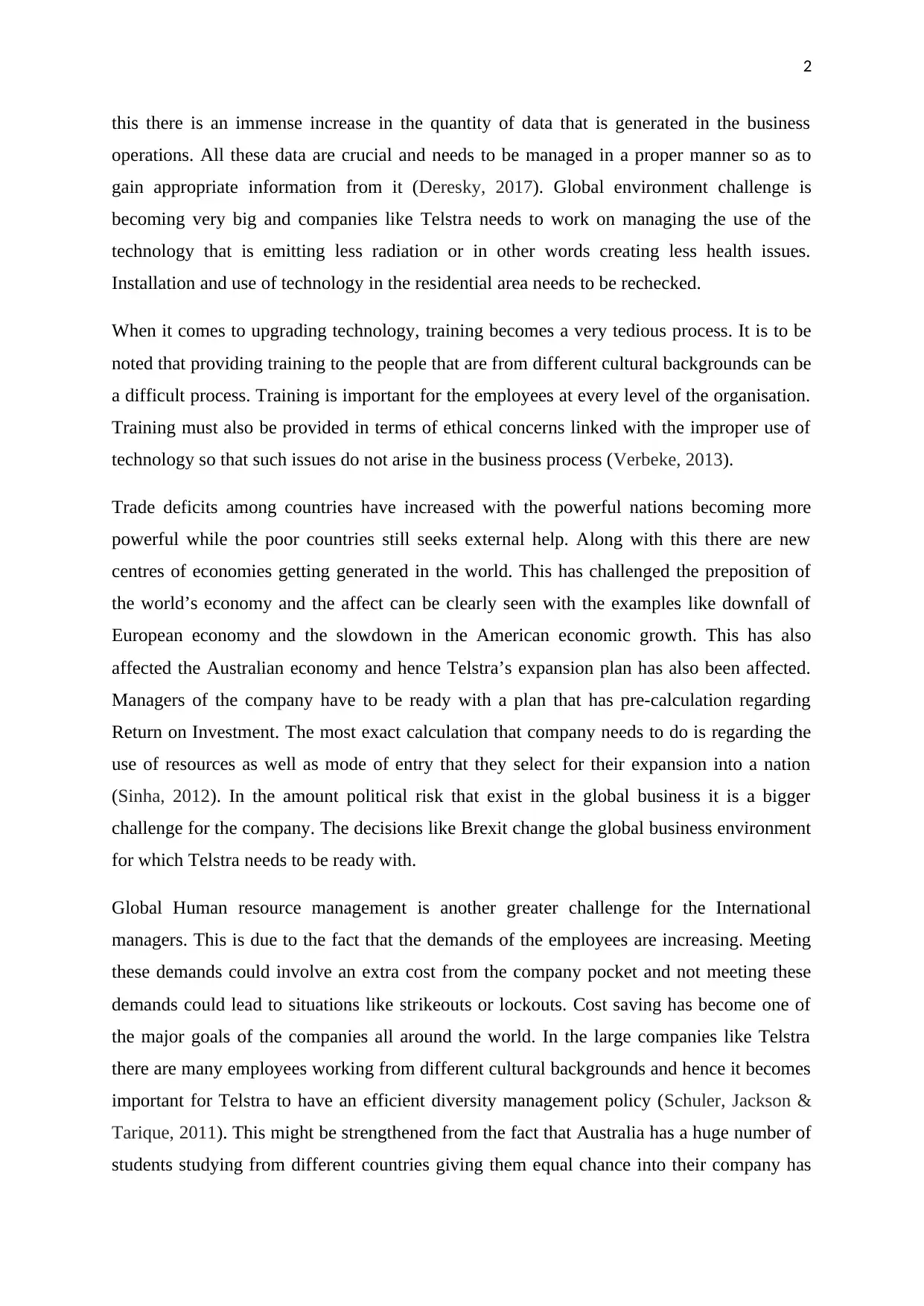
2
this there is an immense increase in the quantity of data that is generated in the business
operations. All these data are crucial and needs to be managed in a proper manner so as to
gain appropriate information from it (Deresky, 2017). Global environment challenge is
becoming very big and companies like Telstra needs to work on managing the use of the
technology that is emitting less radiation or in other words creating less health issues.
Installation and use of technology in the residential area needs to be rechecked.
When it comes to upgrading technology, training becomes a very tedious process. It is to be
noted that providing training to the people that are from different cultural backgrounds can be
a difficult process. Training is important for the employees at every level of the organisation.
Training must also be provided in terms of ethical concerns linked with the improper use of
technology so that such issues do not arise in the business process (Verbeke, 2013).
Trade deficits among countries have increased with the powerful nations becoming more
powerful while the poor countries still seeks external help. Along with this there are new
centres of economies getting generated in the world. This has challenged the preposition of
the world’s economy and the affect can be clearly seen with the examples like downfall of
European economy and the slowdown in the American economic growth. This has also
affected the Australian economy and hence Telstra’s expansion plan has also been affected.
Managers of the company have to be ready with a plan that has pre-calculation regarding
Return on Investment. The most exact calculation that company needs to do is regarding the
use of resources as well as mode of entry that they select for their expansion into a nation
(Sinha, 2012). In the amount political risk that exist in the global business it is a bigger
challenge for the company. The decisions like Brexit change the global business environment
for which Telstra needs to be ready with.
Global Human resource management is another greater challenge for the International
managers. This is due to the fact that the demands of the employees are increasing. Meeting
these demands could involve an extra cost from the company pocket and not meeting these
demands could lead to situations like strikeouts or lockouts. Cost saving has become one of
the major goals of the companies all around the world. In the large companies like Telstra
there are many employees working from different cultural backgrounds and hence it becomes
important for Telstra to have an efficient diversity management policy (Schuler, Jackson &
Tarique, 2011). This might be strengthened from the fact that Australia has a huge number of
students studying from different countries giving them equal chance into their company has
this there is an immense increase in the quantity of data that is generated in the business
operations. All these data are crucial and needs to be managed in a proper manner so as to
gain appropriate information from it (Deresky, 2017). Global environment challenge is
becoming very big and companies like Telstra needs to work on managing the use of the
technology that is emitting less radiation or in other words creating less health issues.
Installation and use of technology in the residential area needs to be rechecked.
When it comes to upgrading technology, training becomes a very tedious process. It is to be
noted that providing training to the people that are from different cultural backgrounds can be
a difficult process. Training is important for the employees at every level of the organisation.
Training must also be provided in terms of ethical concerns linked with the improper use of
technology so that such issues do not arise in the business process (Verbeke, 2013).
Trade deficits among countries have increased with the powerful nations becoming more
powerful while the poor countries still seeks external help. Along with this there are new
centres of economies getting generated in the world. This has challenged the preposition of
the world’s economy and the affect can be clearly seen with the examples like downfall of
European economy and the slowdown in the American economic growth. This has also
affected the Australian economy and hence Telstra’s expansion plan has also been affected.
Managers of the company have to be ready with a plan that has pre-calculation regarding
Return on Investment. The most exact calculation that company needs to do is regarding the
use of resources as well as mode of entry that they select for their expansion into a nation
(Sinha, 2012). In the amount political risk that exist in the global business it is a bigger
challenge for the company. The decisions like Brexit change the global business environment
for which Telstra needs to be ready with.
Global Human resource management is another greater challenge for the International
managers. This is due to the fact that the demands of the employees are increasing. Meeting
these demands could involve an extra cost from the company pocket and not meeting these
demands could lead to situations like strikeouts or lockouts. Cost saving has become one of
the major goals of the companies all around the world. In the large companies like Telstra
there are many employees working from different cultural backgrounds and hence it becomes
important for Telstra to have an efficient diversity management policy (Schuler, Jackson &
Tarique, 2011). This might be strengthened from the fact that Australia has a huge number of
students studying from different countries giving them equal chance into their company has
⊘ This is a preview!⊘
Do you want full access?
Subscribe today to unlock all pages.

Trusted by 1+ million students worldwide
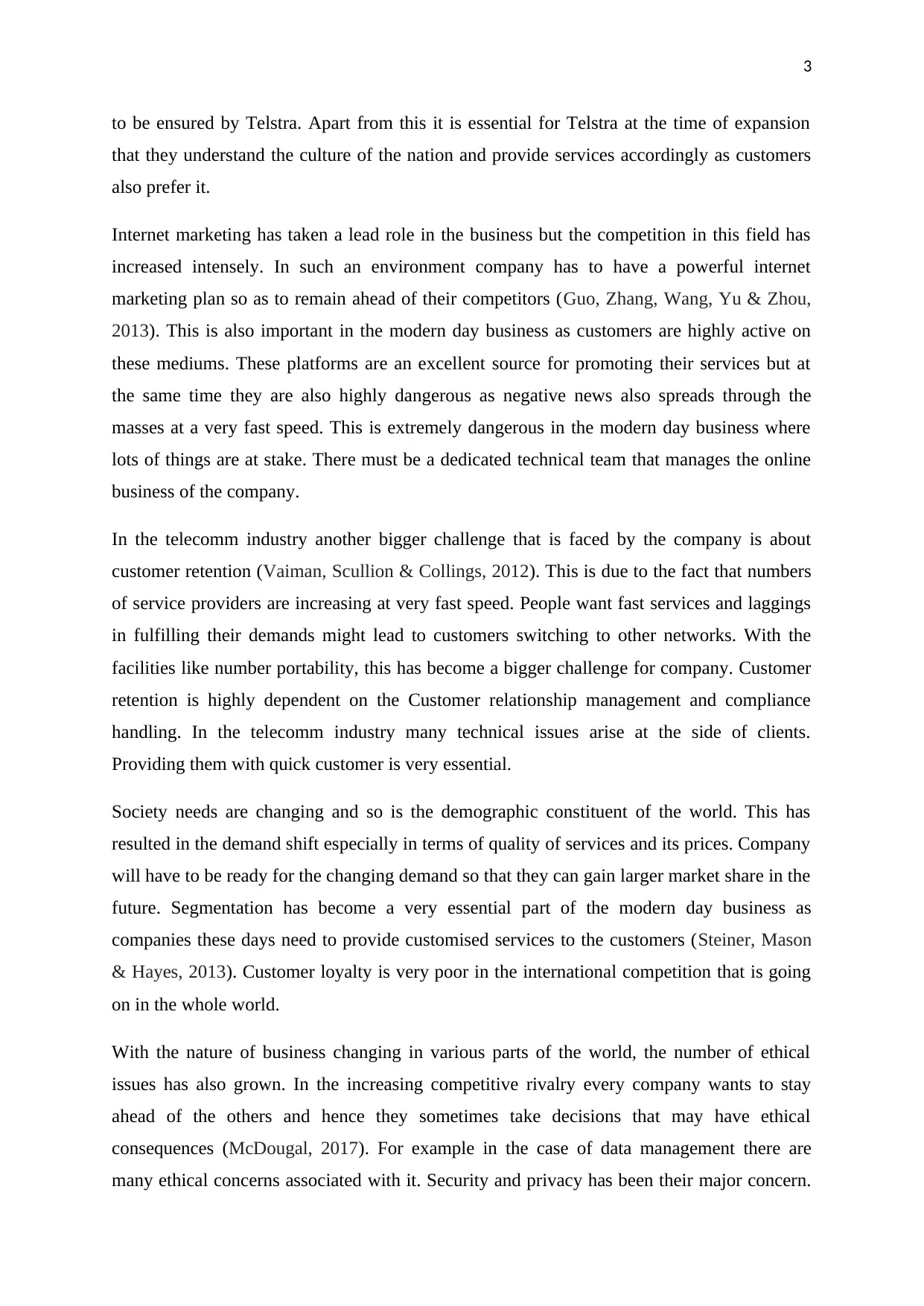
3
to be ensured by Telstra. Apart from this it is essential for Telstra at the time of expansion
that they understand the culture of the nation and provide services accordingly as customers
also prefer it.
Internet marketing has taken a lead role in the business but the competition in this field has
increased intensely. In such an environment company has to have a powerful internet
marketing plan so as to remain ahead of their competitors (Guo, Zhang, Wang, Yu & Zhou,
2013). This is also important in the modern day business as customers are highly active on
these mediums. These platforms are an excellent source for promoting their services but at
the same time they are also highly dangerous as negative news also spreads through the
masses at a very fast speed. This is extremely dangerous in the modern day business where
lots of things are at stake. There must be a dedicated technical team that manages the online
business of the company.
In the telecomm industry another bigger challenge that is faced by the company is about
customer retention (Vaiman, Scullion & Collings, 2012). This is due to the fact that numbers
of service providers are increasing at very fast speed. People want fast services and laggings
in fulfilling their demands might lead to customers switching to other networks. With the
facilities like number portability, this has become a bigger challenge for company. Customer
retention is highly dependent on the Customer relationship management and compliance
handling. In the telecomm industry many technical issues arise at the side of clients.
Providing them with quick customer is very essential.
Society needs are changing and so is the demographic constituent of the world. This has
resulted in the demand shift especially in terms of quality of services and its prices. Company
will have to be ready for the changing demand so that they can gain larger market share in the
future. Segmentation has become a very essential part of the modern day business as
companies these days need to provide customised services to the customers (Steiner, Mason
& Hayes, 2013). Customer loyalty is very poor in the international competition that is going
on in the whole world.
With the nature of business changing in various parts of the world, the number of ethical
issues has also grown. In the increasing competitive rivalry every company wants to stay
ahead of the others and hence they sometimes take decisions that may have ethical
consequences (McDougal, 2017). For example in the case of data management there are
many ethical concerns associated with it. Security and privacy has been their major concern.
to be ensured by Telstra. Apart from this it is essential for Telstra at the time of expansion
that they understand the culture of the nation and provide services accordingly as customers
also prefer it.
Internet marketing has taken a lead role in the business but the competition in this field has
increased intensely. In such an environment company has to have a powerful internet
marketing plan so as to remain ahead of their competitors (Guo, Zhang, Wang, Yu & Zhou,
2013). This is also important in the modern day business as customers are highly active on
these mediums. These platforms are an excellent source for promoting their services but at
the same time they are also highly dangerous as negative news also spreads through the
masses at a very fast speed. This is extremely dangerous in the modern day business where
lots of things are at stake. There must be a dedicated technical team that manages the online
business of the company.
In the telecomm industry another bigger challenge that is faced by the company is about
customer retention (Vaiman, Scullion & Collings, 2012). This is due to the fact that numbers
of service providers are increasing at very fast speed. People want fast services and laggings
in fulfilling their demands might lead to customers switching to other networks. With the
facilities like number portability, this has become a bigger challenge for company. Customer
retention is highly dependent on the Customer relationship management and compliance
handling. In the telecomm industry many technical issues arise at the side of clients.
Providing them with quick customer is very essential.
Society needs are changing and so is the demographic constituent of the world. This has
resulted in the demand shift especially in terms of quality of services and its prices. Company
will have to be ready for the changing demand so that they can gain larger market share in the
future. Segmentation has become a very essential part of the modern day business as
companies these days need to provide customised services to the customers (Steiner, Mason
& Hayes, 2013). Customer loyalty is very poor in the international competition that is going
on in the whole world.
With the nature of business changing in various parts of the world, the number of ethical
issues has also grown. In the increasing competitive rivalry every company wants to stay
ahead of the others and hence they sometimes take decisions that may have ethical
consequences (McDougal, 2017). For example in the case of data management there are
many ethical concerns associated with it. Security and privacy has been their major concern.
Paraphrase This Document
Need a fresh take? Get an instant paraphrase of this document with our AI Paraphraser
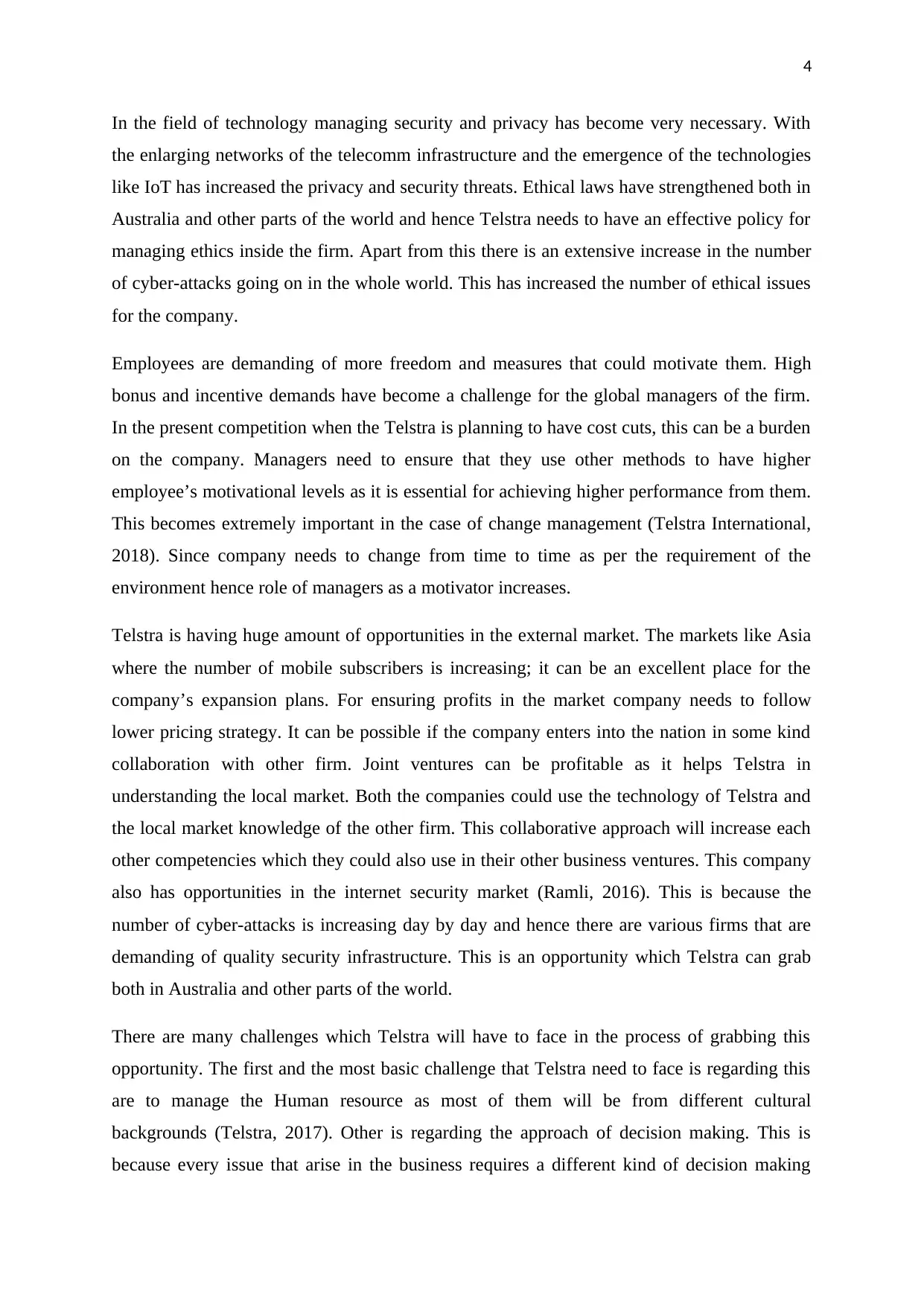
4
In the field of technology managing security and privacy has become very necessary. With
the enlarging networks of the telecomm infrastructure and the emergence of the technologies
like IoT has increased the privacy and security threats. Ethical laws have strengthened both in
Australia and other parts of the world and hence Telstra needs to have an effective policy for
managing ethics inside the firm. Apart from this there is an extensive increase in the number
of cyber-attacks going on in the whole world. This has increased the number of ethical issues
for the company.
Employees are demanding of more freedom and measures that could motivate them. High
bonus and incentive demands have become a challenge for the global managers of the firm.
In the present competition when the Telstra is planning to have cost cuts, this can be a burden
on the company. Managers need to ensure that they use other methods to have higher
employee’s motivational levels as it is essential for achieving higher performance from them.
This becomes extremely important in the case of change management (Telstra International,
2018). Since company needs to change from time to time as per the requirement of the
environment hence role of managers as a motivator increases.
Telstra is having huge amount of opportunities in the external market. The markets like Asia
where the number of mobile subscribers is increasing; it can be an excellent place for the
company’s expansion plans. For ensuring profits in the market company needs to follow
lower pricing strategy. It can be possible if the company enters into the nation in some kind
collaboration with other firm. Joint ventures can be profitable as it helps Telstra in
understanding the local market. Both the companies could use the technology of Telstra and
the local market knowledge of the other firm. This collaborative approach will increase each
other competencies which they could also use in their other business ventures. This company
also has opportunities in the internet security market (Ramli, 2016). This is because the
number of cyber-attacks is increasing day by day and hence there are various firms that are
demanding of quality security infrastructure. This is an opportunity which Telstra can grab
both in Australia and other parts of the world.
There are many challenges which Telstra will have to face in the process of grabbing this
opportunity. The first and the most basic challenge that Telstra need to face is regarding this
are to manage the Human resource as most of them will be from different cultural
backgrounds (Telstra, 2017). Other is regarding the approach of decision making. This is
because every issue that arise in the business requires a different kind of decision making
In the field of technology managing security and privacy has become very necessary. With
the enlarging networks of the telecomm infrastructure and the emergence of the technologies
like IoT has increased the privacy and security threats. Ethical laws have strengthened both in
Australia and other parts of the world and hence Telstra needs to have an effective policy for
managing ethics inside the firm. Apart from this there is an extensive increase in the number
of cyber-attacks going on in the whole world. This has increased the number of ethical issues
for the company.
Employees are demanding of more freedom and measures that could motivate them. High
bonus and incentive demands have become a challenge for the global managers of the firm.
In the present competition when the Telstra is planning to have cost cuts, this can be a burden
on the company. Managers need to ensure that they use other methods to have higher
employee’s motivational levels as it is essential for achieving higher performance from them.
This becomes extremely important in the case of change management (Telstra International,
2018). Since company needs to change from time to time as per the requirement of the
environment hence role of managers as a motivator increases.
Telstra is having huge amount of opportunities in the external market. The markets like Asia
where the number of mobile subscribers is increasing; it can be an excellent place for the
company’s expansion plans. For ensuring profits in the market company needs to follow
lower pricing strategy. It can be possible if the company enters into the nation in some kind
collaboration with other firm. Joint ventures can be profitable as it helps Telstra in
understanding the local market. Both the companies could use the technology of Telstra and
the local market knowledge of the other firm. This collaborative approach will increase each
other competencies which they could also use in their other business ventures. This company
also has opportunities in the internet security market (Ramli, 2016). This is because the
number of cyber-attacks is increasing day by day and hence there are various firms that are
demanding of quality security infrastructure. This is an opportunity which Telstra can grab
both in Australia and other parts of the world.
There are many challenges which Telstra will have to face in the process of grabbing this
opportunity. The first and the most basic challenge that Telstra need to face is regarding this
are to manage the Human resource as most of them will be from different cultural
backgrounds (Telstra, 2017). Other is regarding the approach of decision making. This is
because every issue that arise in the business requires a different kind of decision making
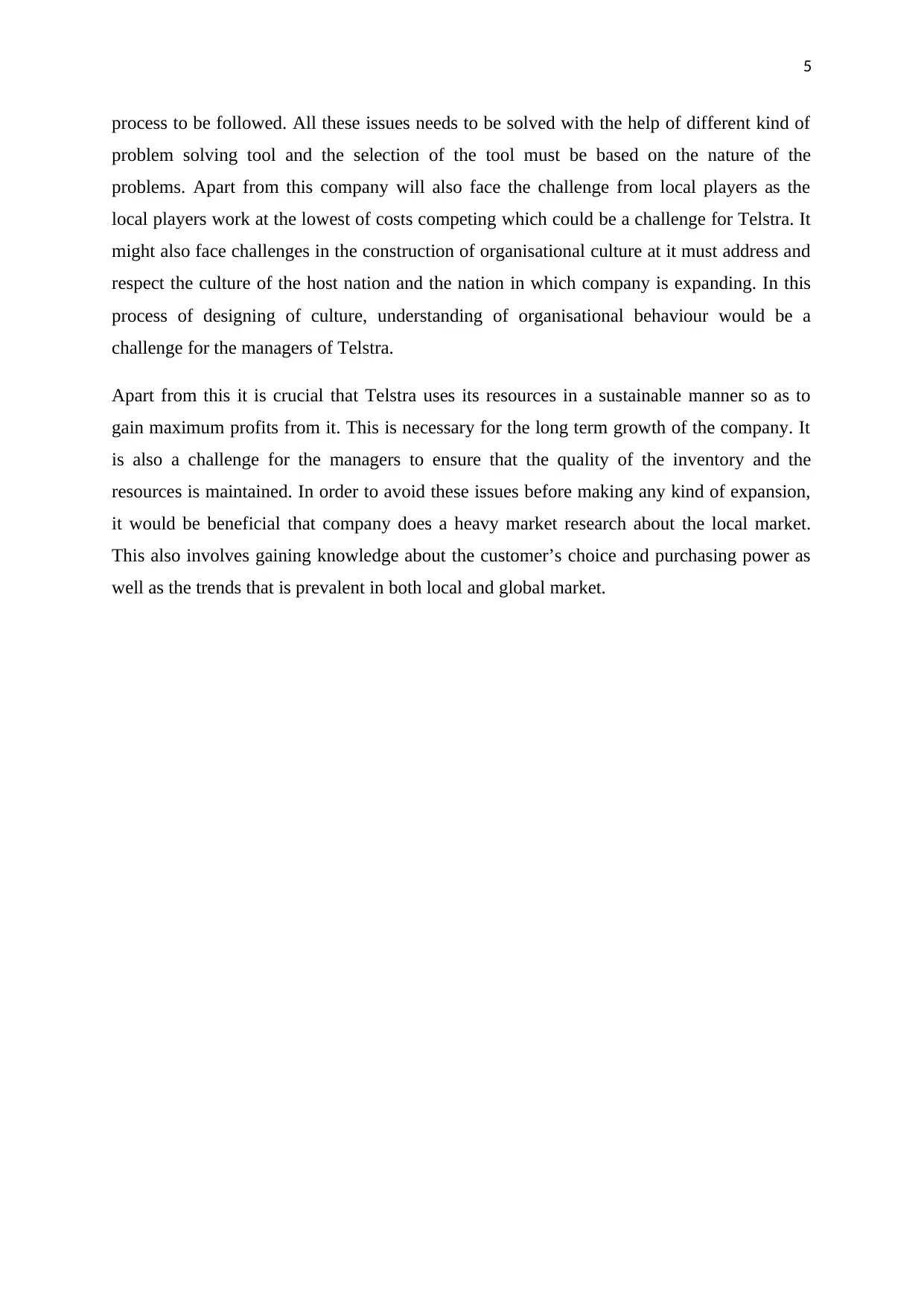
5
process to be followed. All these issues needs to be solved with the help of different kind of
problem solving tool and the selection of the tool must be based on the nature of the
problems. Apart from this company will also face the challenge from local players as the
local players work at the lowest of costs competing which could be a challenge for Telstra. It
might also face challenges in the construction of organisational culture at it must address and
respect the culture of the host nation and the nation in which company is expanding. In this
process of designing of culture, understanding of organisational behaviour would be a
challenge for the managers of Telstra.
Apart from this it is crucial that Telstra uses its resources in a sustainable manner so as to
gain maximum profits from it. This is necessary for the long term growth of the company. It
is also a challenge for the managers to ensure that the quality of the inventory and the
resources is maintained. In order to avoid these issues before making any kind of expansion,
it would be beneficial that company does a heavy market research about the local market.
This also involves gaining knowledge about the customer’s choice and purchasing power as
well as the trends that is prevalent in both local and global market.
process to be followed. All these issues needs to be solved with the help of different kind of
problem solving tool and the selection of the tool must be based on the nature of the
problems. Apart from this company will also face the challenge from local players as the
local players work at the lowest of costs competing which could be a challenge for Telstra. It
might also face challenges in the construction of organisational culture at it must address and
respect the culture of the host nation and the nation in which company is expanding. In this
process of designing of culture, understanding of organisational behaviour would be a
challenge for the managers of Telstra.
Apart from this it is crucial that Telstra uses its resources in a sustainable manner so as to
gain maximum profits from it. This is necessary for the long term growth of the company. It
is also a challenge for the managers to ensure that the quality of the inventory and the
resources is maintained. In order to avoid these issues before making any kind of expansion,
it would be beneficial that company does a heavy market research about the local market.
This also involves gaining knowledge about the customer’s choice and purchasing power as
well as the trends that is prevalent in both local and global market.
⊘ This is a preview!⊘
Do you want full access?
Subscribe today to unlock all pages.

Trusted by 1+ million students worldwide
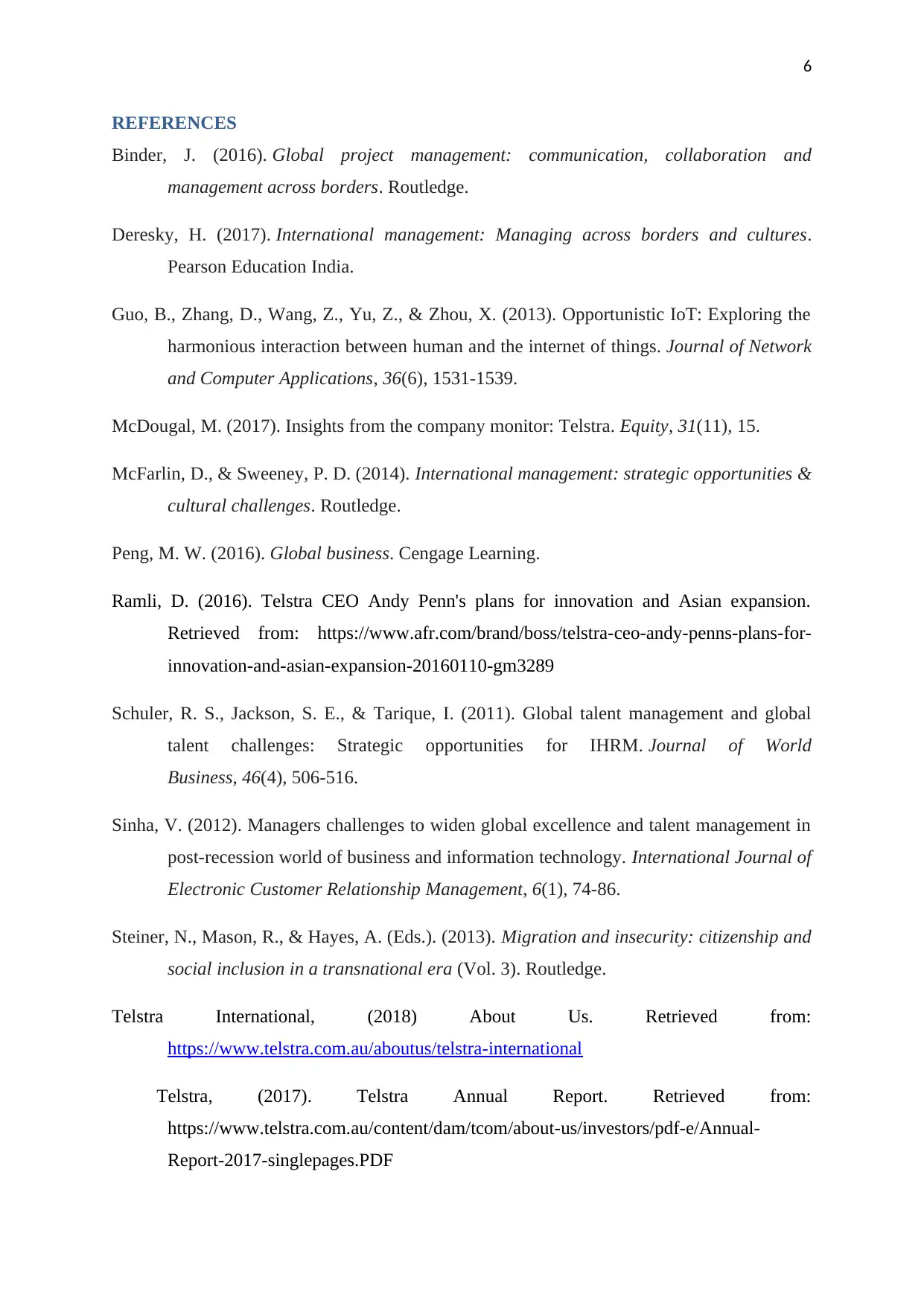
6
REFERENCES
Binder, J. (2016). Global project management: communication, collaboration and
management across borders. Routledge.
Deresky, H. (2017). International management: Managing across borders and cultures.
Pearson Education India.
Guo, B., Zhang, D., Wang, Z., Yu, Z., & Zhou, X. (2013). Opportunistic IoT: Exploring the
harmonious interaction between human and the internet of things. Journal of Network
and Computer Applications, 36(6), 1531-1539.
McDougal, M. (2017). Insights from the company monitor: Telstra. Equity, 31(11), 15.
McFarlin, D., & Sweeney, P. D. (2014). International management: strategic opportunities &
cultural challenges. Routledge.
Peng, M. W. (2016). Global business. Cengage Learning.
Ramli, D. (2016). Telstra CEO Andy Penn's plans for innovation and Asian expansion.
Retrieved from: https://www.afr.com/brand/boss/telstra-ceo-andy-penns-plans-for-
innovation-and-asian-expansion-20160110-gm3289
Schuler, R. S., Jackson, S. E., & Tarique, I. (2011). Global talent management and global
talent challenges: Strategic opportunities for IHRM. Journal of World
Business, 46(4), 506-516.
Sinha, V. (2012). Managers challenges to widen global excellence and talent management in
post-recession world of business and information technology. International Journal of
Electronic Customer Relationship Management, 6(1), 74-86.
Steiner, N., Mason, R., & Hayes, A. (Eds.). (2013). Migration and insecurity: citizenship and
social inclusion in a transnational era (Vol. 3). Routledge.
Telstra International, (2018) About Us. Retrieved from:
https://www.telstra.com.au/aboutus/telstra-international
Telstra, (2017). Telstra Annual Report. Retrieved from:
https://www.telstra.com.au/content/dam/tcom/about-us/investors/pdf-e/Annual-
Report-2017-singlepages.PDF
REFERENCES
Binder, J. (2016). Global project management: communication, collaboration and
management across borders. Routledge.
Deresky, H. (2017). International management: Managing across borders and cultures.
Pearson Education India.
Guo, B., Zhang, D., Wang, Z., Yu, Z., & Zhou, X. (2013). Opportunistic IoT: Exploring the
harmonious interaction between human and the internet of things. Journal of Network
and Computer Applications, 36(6), 1531-1539.
McDougal, M. (2017). Insights from the company monitor: Telstra. Equity, 31(11), 15.
McFarlin, D., & Sweeney, P. D. (2014). International management: strategic opportunities &
cultural challenges. Routledge.
Peng, M. W. (2016). Global business. Cengage Learning.
Ramli, D. (2016). Telstra CEO Andy Penn's plans for innovation and Asian expansion.
Retrieved from: https://www.afr.com/brand/boss/telstra-ceo-andy-penns-plans-for-
innovation-and-asian-expansion-20160110-gm3289
Schuler, R. S., Jackson, S. E., & Tarique, I. (2011). Global talent management and global
talent challenges: Strategic opportunities for IHRM. Journal of World
Business, 46(4), 506-516.
Sinha, V. (2012). Managers challenges to widen global excellence and talent management in
post-recession world of business and information technology. International Journal of
Electronic Customer Relationship Management, 6(1), 74-86.
Steiner, N., Mason, R., & Hayes, A. (Eds.). (2013). Migration and insecurity: citizenship and
social inclusion in a transnational era (Vol. 3). Routledge.
Telstra International, (2018) About Us. Retrieved from:
https://www.telstra.com.au/aboutus/telstra-international
Telstra, (2017). Telstra Annual Report. Retrieved from:
https://www.telstra.com.au/content/dam/tcom/about-us/investors/pdf-e/Annual-
Report-2017-singlepages.PDF
Paraphrase This Document
Need a fresh take? Get an instant paraphrase of this document with our AI Paraphraser
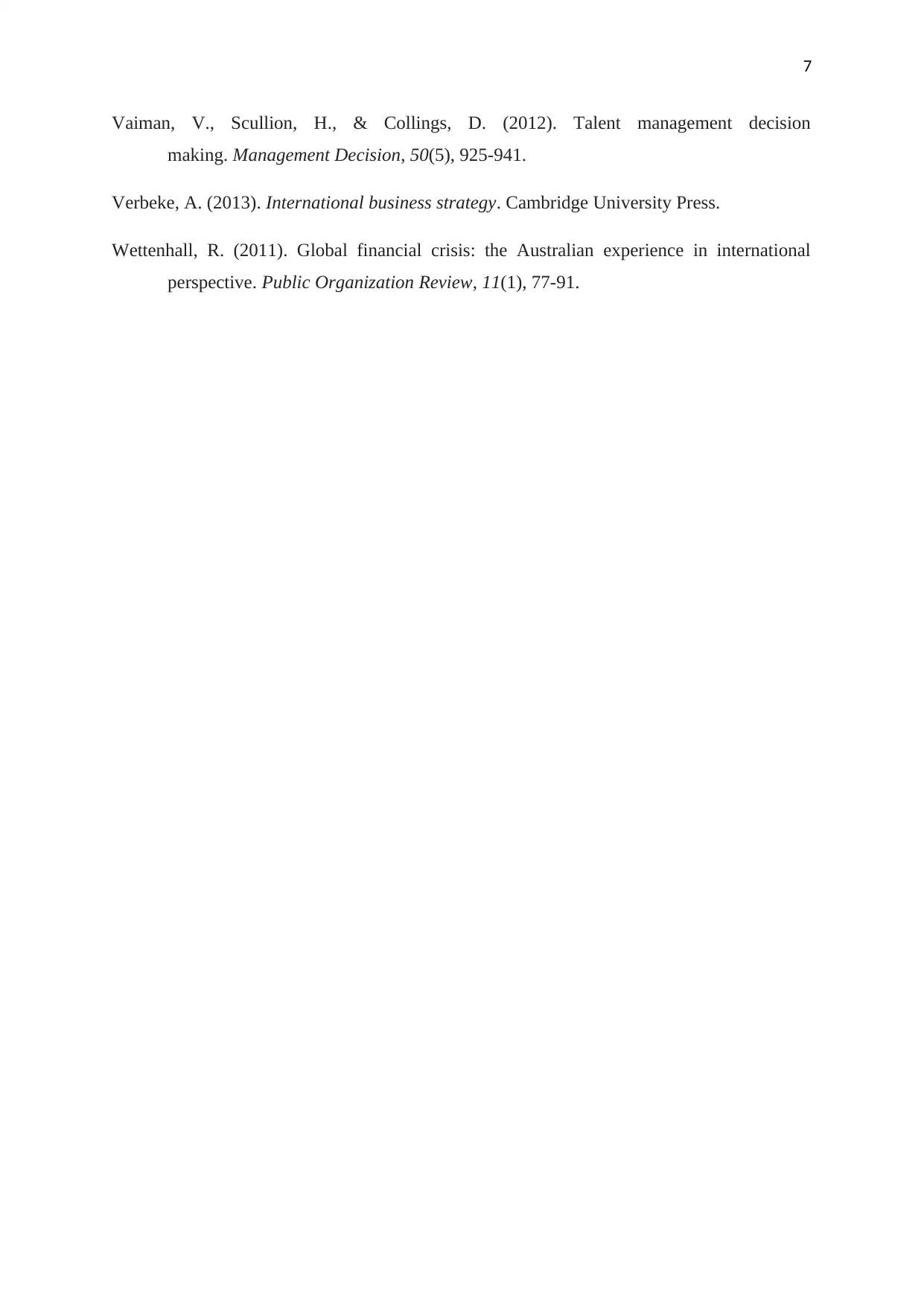
7
Vaiman, V., Scullion, H., & Collings, D. (2012). Talent management decision
making. Management Decision, 50(5), 925-941.
Verbeke, A. (2013). International business strategy. Cambridge University Press.
Wettenhall, R. (2011). Global financial crisis: the Australian experience in international
perspective. Public Organization Review, 11(1), 77-91.
Vaiman, V., Scullion, H., & Collings, D. (2012). Talent management decision
making. Management Decision, 50(5), 925-941.
Verbeke, A. (2013). International business strategy. Cambridge University Press.
Wettenhall, R. (2011). Global financial crisis: the Australian experience in international
perspective. Public Organization Review, 11(1), 77-91.
1 out of 8
Related Documents
Your All-in-One AI-Powered Toolkit for Academic Success.
+13062052269
info@desklib.com
Available 24*7 on WhatsApp / Email
![[object Object]](/_next/static/media/star-bottom.7253800d.svg)
Unlock your academic potential
Copyright © 2020–2026 A2Z Services. All Rights Reserved. Developed and managed by ZUCOL.




